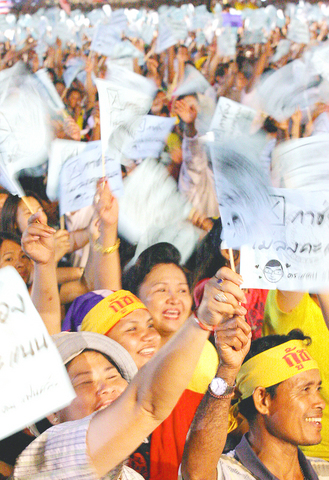Since Thai Prime Minister Thaksin Shinawatra took office five years ago, dozens of journalists who criticized the government have been sacked or sued for libel, TV talk shows have been canceled and radio stations yanked off the air.
Thaksin, a telecom tycoon-turned-politician, has repeatedly blasted reporters who question his policies as ignorant and unpatriotic. He and his close associates have taken over media companies and pressured journalists into subservience, taming what was once hailed as one of Asia's freest presses.
But as an anti-Thaksin movement has gained momentum with almost daily street protests, journalists have begun to report the news as they see it -- not as the prime minister wants it seen. And even state-owned outlets are offering more coverage of government opponents.

PHOTO: AFP
"When people rose to criticize Thaksin, the media -- whether they worked for the state or not -- could no longer close their eyes and ears and pretend not to see it and not report it," said Pattara Khumphitak, president of the Thai Journalists' Association and political editor at the Thai-language newspaper Post Today.
Late last year, tens of thousands of protesters started demonstrating and calling for Thaksin's resignation on charges of corruption, but most television stations did not even mention that an anti-Thaksin movement was brewing.
As the movement gained momentum, Thaksin dissolved parliament last month and called snap elections, and the press had to cover the news that the people in power could no longer cover up.
bad start
The Thai press was in trouble as soon as Thaksin became prime minister in 2001.
Shortly after he took office, Shin Corp, the telecom giant that was owned by his family, fired 21 journalists from its iTV television station.
The iTV journalists, who won a court case and years of back pay for being illegally dismissed, said they were pressured to downplay negative news about Thaksin and his Thai Rak Thai party.
The dismissals turned out to be a harbinger of more attacks on the media.
Several television and radio talk shows were taken off the air, editors and reporters were fired, and the government liberally filed lawsuits against its critics.
"Before the anti-Thaksin movement began, we were under a lot of pressure ... nobody dared to go up against him, so he had a free hand to manipulate the media," said Karuna Buakamsri, one of the sacked iTV reporters.
Although Thaksin still lashes out at reporters, the media have scored a few victories.
A Thai criminal court last week acquitted media critic Supinya Klangnarong who was sued by Shin Corp for suggesting that it had profited from its connections with the government.

Former Nicaraguan president Violeta Chamorro, who brought peace to Nicaragua after years of war and was the first woman elected president in the Americas, died on Saturday at the age of 95, her family said. Chamorro, who ruled the poor Central American country from 1990 to 1997, “died in peace, surrounded by the affection and love of her children,” said a statement issued by her four children. As president, Chamorro ended a civil war that had raged for much of the 1980s as US-backed rebels known as the “Contras” fought the leftist Sandinista government. That conflict made Nicaragua one of

COMPETITION: The US and Russia make up about 90 percent of the world stockpile and are adding new versions, while China’s nuclear force is steadily rising, SIPRI said Most of the world’s nuclear-armed states continued to modernize their arsenals last year, setting the stage for a new nuclear arms race, the Stockholm International Peace Research Institute (SIPRI) said yesterday. Nuclear powers including the US and Russia — which account for about 90 percent of the world’s stockpile — had spent time last year “upgrading existing weapons and adding newer versions,” researchers said. Since the end of the Cold War, old warheads have generally been dismantled quicker than new ones have been deployed, resulting in a decrease in the overall number of warheads. However, SIPRI said that the trend was likely

BOMBARDMENT: Moscow sent more than 440 drones and 32 missiles, Volodymyr Zelenskiy said, in ‘one of the most terrifying strikes’ on the capital in recent months A nighttime Russian missile and drone bombardment of Ukraine killed at least 15 people and injured 116 while they slept in their homes, local officials said yesterday, with the main barrage centering on the capital, Kyiv. Kyiv City Military Administration head Tymur Tkachenko said 14 people were killed and 99 were injured as explosions echoed across the city for hours during the night. The bombardment demolished a nine-story residential building, destroying dozens of apartments. Emergency workers were at the scene to rescue people from under the rubble. Russia flung more than 440 drones and 32 missiles at Ukraine, Ukrainian President Volodymyr Zelenskiy

Indonesia’s Mount Lewotobi Laki-Laki yesterday erupted again with giant ash and smoke plumes after forcing evacuations of villages and flight cancelations, including to and from the resort island of Bali. Several eruptions sent ash up to 5km into the sky on Tuesday evening to yesterday afternoon. An eruption on Tuesday afternoon sent thick, gray clouds 10km into the sky that expanded into a mushroom-shaped ash cloud visible as much as 150km kilometers away. The eruption alert was raised on Tuesday to the highest level and the danger zone where people are recommended to leave was expanded to 8km from the crater. Officers also